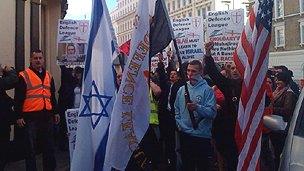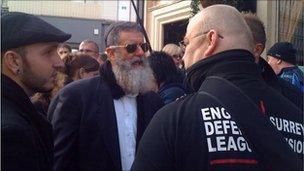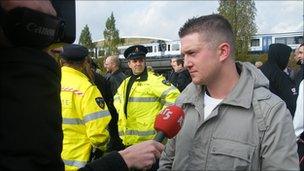English Defence League searches for foreign allies
- Published

EDL supporters have held protest marches in the UK in a bid to spread their message
The English Defence League (EDL) formed in the wake of a demo by a small group of Muslims at a Luton homecoming parade in March 2009.
Since then they have protested all over the UK against "radical Islam". Now the group is attempting to take its message overseas.
"The British people want to have their voices heard. A resistance to Islamification was always going to happen," says EDL "leader" Tommy Robinson - a pseudonym he took as a homage to a famous football hooligan.
"Tommy", whose real name is Steven Lennon, is about two hours late for a meeting in a London pub but, upon arriving, he's given a hero's welcome, handed a drink and rushed upstairs to meet the EDL's American guest.
Rabbi Nachum Shifren is a Tea Party activist and shares the EDL's views on Islam.
"The American people are facing the most insidious threat to the American way of life and, just like the Brits, are asleep."
EDL members went to New York on 11 September to oppose the "Ground Zero Mosque", or Islamic cultural centre.
The proposed construction close to the scene of the terror attacks has caused worldwide controversy and Dutch anti-Islam MP Geert Wilders also made speeches condemning the plans.

The EDL has found an ally in Tea Party activist Rabbi Nachum Shifren
This meeting in a London pub is the Rabbi returning support.
There's back-slapping and mutual admiration as Mr Lennon and the Rabbi descend into a discussion about the dangers of Islam.
Mr Lennon was born in Luton to Irish immigrant parents. He is 27 and, despite his swagger, looks younger.
"I don't claim to have ever been an angel, nor a politician who wears a suit - we're normal people from the towns and cities of this country. We're not gonna stop; this is the rest of my life," says Mr Lennon, whose movements are restricted by a number of bail conditions.
EDL demonstrations have covered the length and breadth of the UK, attracting crowds which are sometimes in the thousands.
Opponents, like Unite Against Fascism, say the EDL are racist, Islamaphobic hooligans.
'Underlying resentment'
Mohammad Ayoub, a founder of Muslim Youth magazine The Revival, says the EDL are tapping into wider concerns.
"There are underlying resentments that are not being addressed by mainstream politicians and, in fact, are sometimes capitalised upon to win votes."
More than the US, the EDL has set it sights on links with Europe. The group recently travelled to Amsterdam in support of Geert Wilders.
It was intended to be the first meeting of the European Freedom Initiative - a collective of groups all concerned about "the threat from Muslims". Along with the EDL, members include Politically Incorrect of Germany and Alliance to Stop Sharia from France.
But the Amsterdam demo didn't exactly go to plan.
At the last minute, Amsterdam's mayor moved the demo to a scrap of land miles out of the city. Turnout is low, very low.
Mr Lennon stands on a stage and makes a brief speech.

Steven Lennon visited Amsterdam in support of far-right anti-Islamist Dutch politician Geert Wilders
"You're lucky to have Geert Wilders, in Sweden you have politicians standing up for you; in England we have no-one standing up for our freedoms," he says.
Sikh EDL member Guramit Singh stands at the site of the demo, surrounded by many more members of the press than protestors.
"It's not been the greatest of days, but we stand by anyone who is sympathetic to our cause and we're here to support the Dutch Defence League".
Someone interrupts to shake Amit's hand. "Shame about today mate," he says, and with that, less than half an hour after arriving, the EDL get back in their van for a sharp exit - its windows already smashed.
On the other side of Amsterdam, Anna Huygen has organised the counter-EDL demo. There is music, speeches and Moroccan mint tea provided by local Muslims.
"I'm worried about this climate where racism seems to be becoming normal," she says.
"I think Muslims feel under threat at the moment. There's an atmosphere of fear, people have been convinced by Geert Wilders that 'Sharia is coming' and there is a 'tsunami' of Muslims arriving, and it's just not the case."
Professor Matthew Goodwin, an expert on far right groups, says it "becomes much more difficult" to control organisations of this sort when they start "linking up".
"What the EDL and other far right groups across Europe are trying to do is mobilise is broader alliance against Muslims.
"Over the next two to five years there's going to be a very significant debate about the accession of Turkey to the European Union so these groups are trying to mobilise a pan European opposition to that," says Prof Goodwin, who has advised the Home Office.
'Poster boy' jibe
Goodwin says the EDL have set themselves apart from other far-right groups, such as the BNP, because of a fairly diverse membership (it was a gay and Jewish division).
Guramit Singh admits he's lost some Muslim friends because of his new calling. He even lost a girlfriend, but says his family are supportive.
EDL leader Tommy Robinson debates with Mohammad Ayoud
"The EDL is not racist. The UAF (Unite Against Fascism) call me a puppet boy [because he is Sikh] but I'm the one pulling the strings here. They call me a poster boy but I'm the one putting up the posters."
I asked Amit about some of the chants at EDL protests; insults like "dirty bastard" or the more specific "where's your [expletive] cousin now?" In another chant, "En-ger-land" quickly becomes "Allah Allah who the [expletive] is Allah?".
"People do want to turn around and say 'who the [expletive] is this bloke called Allah.
"Yes, it's insulting but look what we've got to learn by. We've got the Koran and the Hadith, which says it's going to do all these disgusting things to the infidels, so people are going to question it."
Listen to Who's Afraid of the EDL? at 1800 GMT on 6 December 2010 on the BBC Asian Network or via the BBC iPlayer up to one week after the broadcast.
- Published19 November 2010